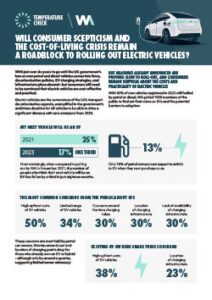One of the key questions on the minds of business representatives attending Conservative Party Conference in Manchester this week will be just what the implications of the Prime Minister’s reset on net zero are. Industry will be looking for reassurance from ministers over the coming days that the broad net zero agenda remains in place and for confidence on other policy measures.
Last week, WA hosted a webinar with Nathalie Thomas, former Energy Correspondent and writer of the FT’S LEX column and Sam Hall, Director of the Conservative Environment Network to explore whether the political consensus on net zero is broken, and if it is, what that means for business.
These are our key takeaways:
1. There may have been limited substantial policy changes, but it has still caused uncertainty
The Prime Minister’s speech gathered significant interest, but on the substance, it arguably moved the dial less. While the phase-out date for petrol and diesel vehicles has shifted back five years, the ZEV mandate proposals announced by the government in recent days showed there will still be a very significant increase in EVs as a proportion of the market by 2030.
There are large swathes of the net zero agenda – particularly on industrial and power decarbonisation – that have not been impacted by these specific proposals. However, Sunak’s speech still caused concern and disruption to many of these businesses. For businesses and investors the sense that long-term policy frameworks could change so suddenly, has cast doubt over the certainty and stability of other policy areas.
2. It’s all about the politics
As we enter a critical general election campaign businesses need to recognise that politics is ruling the day. Ideas may stand up on pure policy and technical terms, but if they don’t fit into the government’s political agenda they’re unlikely to be taken seriously, and policy already in train that doesn’t meet this test could be under threat.
This means it is essential for business to fully understand the different factions and priorities within government, and knowing who’s influencing No10 and key departments. Messaging and policy asks from businesses need to be aligned with these political trends to succeed.
3. But how effective was the political trap the government tried to set for Labour?
The motivating factor within government was to force Labour into having to defend policies presented by government as expensive and disruptive to consumers. No10 wanted to create a ‘wedge’ between the parties. The Labour Party appear to have avoided this with a pragmatic commitment to reinstate the 2030 ICE phase-out date and by suggesting they will review the approach to domestic heating if they enter government.
The Conservative Party’s position in the polls has stabilised, and in some cases improved since the speech, but it is still to be seen whether it changes the fundamentals ahead of the general election. Currently, that doesn’t appear to be the case.
4. Businesses can do more to communicate the benefits of the green transition
Businesses are understandably frustrated at the policy instability. However, it also places the spotlight on the responsibility that businesses have to make the case for net zero and the green transition. The Prime Minister’s renewed focus on consumer affordability makes it even more critical for businesses to show that the agenda – and specific policies that will fit within it – will reduce costs for consumers and offer the best value for taxpayers and consumers.
Equally, the promise of ‘green jobs’ is made regularly, but there’s a renewed opportunity in the run-up to the next general election for businesses to be more specific and tangible about this – where are these jobs, what will they look like, how can they show they are ‘real’ and not just numbers from a spreadsheet?
This will make it much harder for policymakers to row back on the wider agenda in future, with clearer acceptance of the benefits and value, with net zero not just perceived as a cost.
